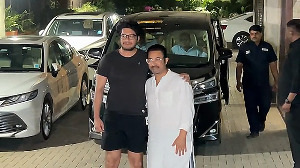 India is all set for the maiden launch on Monday of an indigenous winged Reusable Launch Vehicle--that is being dubbed as its own space shuttle--from Sriharikota spaceport in Andhra Pradesh.
India is all set for the maiden launch on Monday of an indigenous winged Reusable Launch Vehicle--that is being dubbed as its own space shuttle--from Sriharikota spaceport in Andhra Pradesh.
"The weather is fine and the countdown for the launch is on schedule," K Sivan, Director of Vikram Sarabhai Space Centre, told PTI.
The RLV Technology Demonstration, that is ultimately aimed at putting satellites into orbit around earth and then re-enter atmosphere, will be carried up on a solid rocket motor. The nine-metre long rocket weighs 11 tonnes.
"The launch window for the RLV-TD is between 7am and 11 am," a senior ISRO official said.
Very similar in its looks to the US space shuttle, the the double delta-winged RLV-TD being experimented is a scale model which is almost 6 times smaller than the final version.
The 6.5 m long 'aeroplane'-like structure weighs 1.75 tonnes and will be hoisted into the atmosphere on the special rocket booster.
After launch from the Sriharikota spaceport, about 100 km from Chennai, it will be glided back onto a virtual runway in the Bay of Bengal, some 500 km from the coast.
The vehicle will be taken to a height of over 70 km and released for its re-entry into the atmosphere.
The mission, known as the hypersonic flight experiment, is expected to last about 10 minutes from liftoff to splashdown.
The RLV-TD is described as "a very preliminary step" in the development of a reusable rocket, whose final version is expected to take 10-15 years.
This will be the first time Indian Space Research Organisation will be launching a winged flight vehicle.
The government has invested Rs 95 crore into the RLV-TD project.
Indian Space Research Organisation Chairman Kiran Kumar while explaining the importance of the experimental RLV said it is essentially an attempt by India to bring down the cost of making infrastructure in space.
If reusable rockets become a reality, the cost of access to space may come down by 10 times, he said.
"The RLV is a mechanism for us to bring down the cost of launch. We intend to go through a series of technology demonstration exercises, first one of it, what we call HEX-01, that is a hypersonic experiment. It is called a winged body," Kumar said.
"Therefore, we are designing for the first time a winged body, which will come back from space. It will be carried up on a solid rocket motor. In addition, this is the first of a series of experiments and we still have a long way to go till we reach the actual RLV, which will give us a tremendous capacity in terms of launching at a very low cost," he added.
"We will be launching from Sriharikota, and the plane like winged body will land in the ocean, in the Bay of Bengal. That is the first one, but then ultimately, the objective will be this winged body will come and land on the Sriharikota island," Kumar said.
Kumar said ultimately a kind of a runway like one used to see for American space shuttles will be made in Sriharikota.
"When it comes to the final stage, that is what will happen. This winged body will come back on to the land at Sriharikota."
Image used for representation purpose only.











 © 2025
© 2025